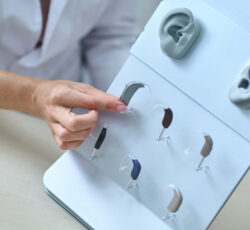 Finding the right hearing aid can make a significant difference in improving your quality of life and ensuring that you can fully participate in conversations and activities. With a vast range of options available, it can be overwhelming to choose the right one for your needs. In this blog post, we will provide you with some valuable tips on how to choose the right hearing aid, with a specific focus on finding a device that fits well and is true to size.
Finding the right hearing aid can make a significant difference in improving your quality of life and ensuring that you can fully participate in conversations and activities. With a vast range of options available, it can be overwhelming to choose the right one for your needs. In this blog post, we will provide you with some valuable tips on how to choose the right hearing aid, with a specific focus on finding a device that fits well and is true to size.
1. Consult with an Audiologist:
Before purchasing a hearing aid, it’s crucial to consult with an audiologist. An audiologist is a hearing healthcare professional who can assess your hearing needs and recommend the most suitable hearing aid for you. They will conduct a comprehensive evaluation to determine the extent of your hearing loss, your lifestyle, budget, and any specific requirements you may have. Relying on their expertise will help narrow down the options and ensure that you choose a hearing aid that meets your unique needs.
2. Consider the Style:
Hearing aids come in various styles, each with its own advantages and considerations. The most common styles include behind-the-ear (BTE), in-the-ear (ITE), and in-the-canal (ITC). BTE hearing aids are worn behind the ear and are suitable for all degrees of hearing loss. ITE hearing aids fit entirely in the outer portion of the ear and are more visible but offer more power and features. ITC hearing aids are smaller and fit partially in the ear canal, making them less visible. Consider your aesthetic preferences, comfort, and level of hearing loss when choosing the style of your hearing aid.
3. Get Accurate Measurements:
When it comes to choosing a hearing aid that fits well and is true to size, accurate measurements are essential. Your audiologist will take impressions of your ears to ensure that the hearing aids are custom-made to fit comfortably and securely. Ill-fitting hearing aids can cause discomfort, pain, and even exacerbate your hearing loss. A properly fitting device will provide optimal sound quality while remaining comfortable throughout the day.
4. Consider Your Lifestyle and Needs:
It’s important to consider your lifestyle and specific needs when choosing a hearing aid. Think about the environments you frequent the most, such as work, socializing, or outdoor activities. This will help determine the features your hearing aid should have, such as noise reduction, telecoil compatibility, or Bluetooth connectivity. Additionally, consider any physical constraints you may have that could affect your ability to handle and operate certain types of hearing aids.
5. Try Different Devices:
Don’t be afraid to try different hearing aids to find the perfect fit. Many manufacturers offer trial periods, allowing you to test the device before making a final decision. Take advantage of this opportunity and wear the hearing aid in different environments to assess its performance and comfort. Pay attention to how well it amplifies sound, how it fits in your ear, and how it feels during extended periods of use. By trying different devices, you can find the one that suits you best.
Conclusion
Choosing the right hearing aid is a crucial step in improving your hearing and overall quality of life. Consulting with an audiologist, considering the various styles, getting accurate measurements, and taking into account your lifestyle and needs are essential factors to consider. By following these tips, you can find a hearing aid that fits well and is true to size, providing you with the optimal sound quality and comfort you deserve. Remember, your hearing health is important, and investing in the right hearing aid will make a significant difference in your daily life.

150 Trackbacks